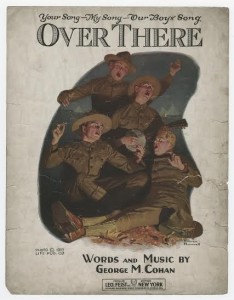
“Over There,” a patriotic piece of music from 1917 (Cohan 4) that encouraged American people of all ages to join the military during the beginning of World War I, was composed by George M. Cohan. Cohan was a singer, songwriter, actor, and playwright (Morehouse 178) from the early twentieth century who composed “Over There,” which has been referred to as “greatest song of the First World War” (Morehouse 17). Cohan’s “Over There” serves as a prime example of pro-American music during the First World War, and how such themes as patriotism worked into the realms of the everyday American life.
Origins of “Over There”
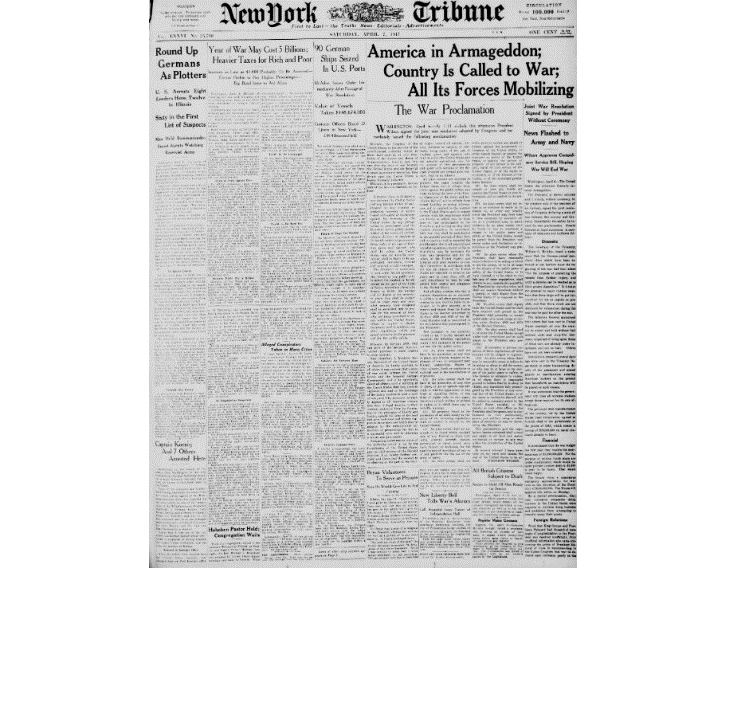
Physical Features of the Primary Source
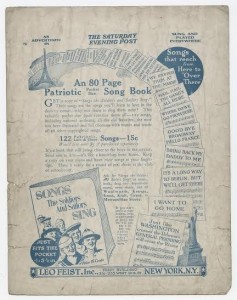
The printed sheet music of “Over There,” held in the W.S. Hoole Special Collections Library, has a front cover that features a Norman Rockwell painting depicting a group of men singing in what seems to be a collaborative manner (Rockwell). The fact that such a prominent painter’s work was duplicated for the sheet music from Life magazine (Rockwell), resulting in a richly illustrated cover with multiple colors, signals the cultural importance of this piece to an observer today. The
banjo-playing men signify the pro-American theme of the song, as the banjo would have been
recognized as a uniquely American instrument. Inside, the sheet music has been printed with black ink, but there are also handwritten markings. Although there is some discoloration on the cover and sheet music, the collection itself seems to be in good condition, with only minor wear and tear on the edges with slight wrinkling of the covers. The back cover is printed in a cheaper blue ink, which differs from the expensive, multicolored front cover. The content from the back cover is an advertisement selling a hand-held book of patriotic songs. This advertisement aligns with the significance of the sheet music for the purpose of home performance. However, the cover page would likely increase the expense of this particular copy of “Over There,” because color printing was an expensive and time-consuming process during the early 20th century. Like this primary source example in the Hoole Collection, most of the sheet music reproductions of this piece would have been intended for home use, reflecting an early 20th century culture of music-making in the American home. With this source, the music setting is arranged for voice and piano reproduction.
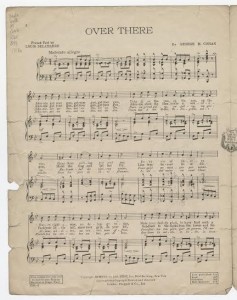
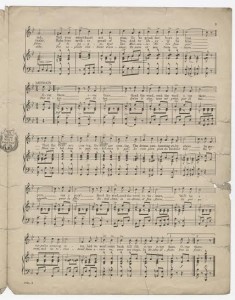
The complementary French translation by Louis Delamarre, which is found on the first page of sheet music directly to the left of George M. Cohan’s name (Cohan 2), increases the value of the particular source both today as a piece of archived text and at that time period because texts would not have been as easy to translate without the advantage of today’s internet. The French translation aligns with the source’s vocal reproduction purpose, targeting not only an American audience, but the French audience that allied with the United States. On the back page there is an advertisement intending to sell an 80-page, handheld, patriotic songbook called “Songs the Soldiers and Sailors Sing,” composed of 122 patriotic songs that were popular during the time, for the price of 15 cents. Quotes in the advertisement like “It’s a book that will bring cheer to the boys in service,” and “Their songs are the songs you’ll love to learn in the days to come- Why not learn to sing them now?” (Cohan 4) support “Over There” as a pro-American piece intended to promote support for the war.
Lyrical Content
Cohan’s simple but effective lyrics intend to target a public audience of the American people with a persuasive message to join the war. Cohan’s first verse written immediately spawns a patriotic call to arms, with the lines “Johnnie, get your gun, get your gun, get your gun/ Take it on the run, on the run, on the run” (Morehouse 126). Cohan uses such military vocabulary and demanding initiative to create a sense of obligation and pride associated with joining the military, as joining the war effort would “make your daddy glad” as seen in later lyrics. Cohan also illustrates pro-American imagery, referencing America as the “Red, White, and Blue.” The bugle call tone of the song and lyrics make the song easier to sing along to, with repetitive lyrics introduced in the first verse like “get your gun” and “on the run.”
“Over There” and the Future
“Over There” became a significant song associated with the support of World War I, which can be contributed to Cohan’s popularity and success on Broadway. Even today, renditions of “Over There” are created and re-popularized, such as Grampa in The Simpsons singing it in an episode (“The War of The Simpsons”), or the chorus being referenced in in Frasier (“Where Every Bloke Knows Your Name). The rhythmic call-and-response flow of “Over There” has translated to its mass reproduction both in professional studios, with singer Nora Bayes, and in the average American household, as seen with the physical nature of the primary source. With prominent figures of the time like Nora Bayes and Norman Rockwell contributing to the individual aspects of the piece like the song’s audio production or the sheet music’s cover art, the success of “Over There” can be attributed to each unique aspect analyzed in the primary source.
Works Cited
Cohan, George M., Louis Delamarre, and Norman Rockwell. Over There. n.p.: New York : Leo. Feist Inc.; London, England : Herman Darewski Music Pub. Co., [1918?], c1917., 1918. Music score. W.S. Hoole Library Rare Sheet Music Collection. OCLC: 01086759
Morehouse, Ward. George M. Cohan, Prince of the American Theater. Philadelphia: J.B. Lippincott, 1943. Print.
New-York Tribune. (New York [N.Y.]), 07 April 1917. Chronicling America: Historic American Newspapers. Library of Congress.
“Over There” The Library of Congress. <loc.gov>. Cohan, George M. Edison. Murray, Billy. Sound recording. 1917. Web. 04 Oct. 2015.
Rockwell, Norman. Over There. c1918. Photocopy painting. Life Publishing Company.
“The War of The Simpsons.” The Simpsons. Fox. 2 May. 1991. Television.
“Where Every Bloke Knows Your Name.” Frasier. NBC. 6 Jan. 1998. Television.
Austin Goodwin, Michael Amling, Grady Worsham, and Nicholas Turner
31 October 2015